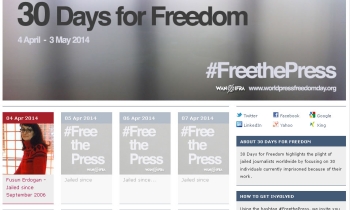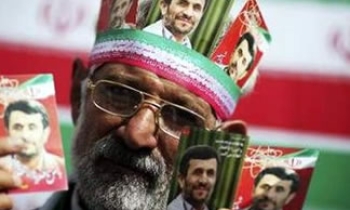An Afghan magazine editor jailed for publishing anti-Islamic articles was freed on December 24. Ali Mohaqiq Nasab, editor of monthly Haqooq-e-Zan (Women's Rights), was arrested in October and sentenced to jail after complaints about his articles. He had been convicted on October 22 and sentenced to two years of hard labour.

"The local court in Kabul has freed Nasab following his apology," said Mawlavi Fazal Ahmad Manawi, deputy for the Supreme Court, Thursday adding that Nasab has promised that he would not repeat such acts in future. During an appeal hearing on Wednesday, Nasab said he was a Muslim and not an apostate. He was then given a six-month suspended sentence, Manawai explained.
Nasab, 50, was arrested on October 1 for publishing articles deemed blasphemous and anti-Islamic. One of the stories published in Haqooq-e-Zan (Women's Rights) questioned the harsh punishment under Shari'a law for women found guilty of adultery, such as stoning. Another article argued that giving up Islam is not a crime. Nasab, a Shi'ite, was arrested following a complaint made to the country's Supreme Court by Mohaiuddin Baluch, religious advisor to Afghanistan President Hamid Karzai.
The judges in charge of the case accused him of intentionally publishing anti-Islamic articles and said he should be severely punished. Mohaqiq Nasab, who is also an Islamic scholar, denied the charges.
Nasab's jailing was widely condemned by rights and press freedom bodies. His release has been, likewise, welcomed.
"This is a great victory for our journalists and for free speech in our beloved land," said Rahimullah Samander, President of the Afghanistan Independent Journalists' Association (AIJA). "The court has finally accepted that he was innocent," he said.
The Committee to Protect Journalists (CPJ) welcomed Wednesday the appeals court's ruling ordering the release of Nasab. "It is a relief to have the court order the release of our colleague Ali Mohaqiq Nasab," said CPJ Executive Director Ann Cooper. "This is a positive development for the Afghan media. The constitutional protections guaranteeing freedom of the press must be respected by the government."

"The Kabul High Court's decision is a defeat for those religious leaders and the prosecutor who were demanding an even harsher penalty against Nasab", Reporters sans Frontières (RSF) said, adding, "The campaign for his release in Afghanistan and abroad was not in vain."
President Hamid Karzai signed the revised law in March 2004 that carried over an existing ban on content deemed "insulting" to Islam. Criminal penalties for press offenses were left vaguely worded, leaving open the possibility of punishment in accordance with the conservative Shari'a law. When the law was signed, government officials said that journalists could only be detained with the approval of a 17-member commission of government officials and journalists. This approval had not been obtained before Nasab's arrest.
President Karzai, himself, had been under pressure from the international community to release Nasab, apart from having to now contend with Yunus Qanuni, the ethnic Tajik opposition leader who has just been elected president of the lower house of parliament, narrowly beating a former factional leader allied to Karzai. Qanuni was one of Karzai's primary rivals, having finished second to him in the presidential elections last year. He was narrowly elected chairman of the assembly in a vote Wednesday last.
Afghanistan had no elected national assembly since 1973, after which coups and a Soviet invasion plunged the country into decades of chaos that killed than 1 million people. That period was followed by the rule of the Islamic extremist Taliban. The parliament's opening marked Afghanistan's final step in its transition to democracy after US-led forces toppled the Taliban regime for sheltering Osama bin Laden.









